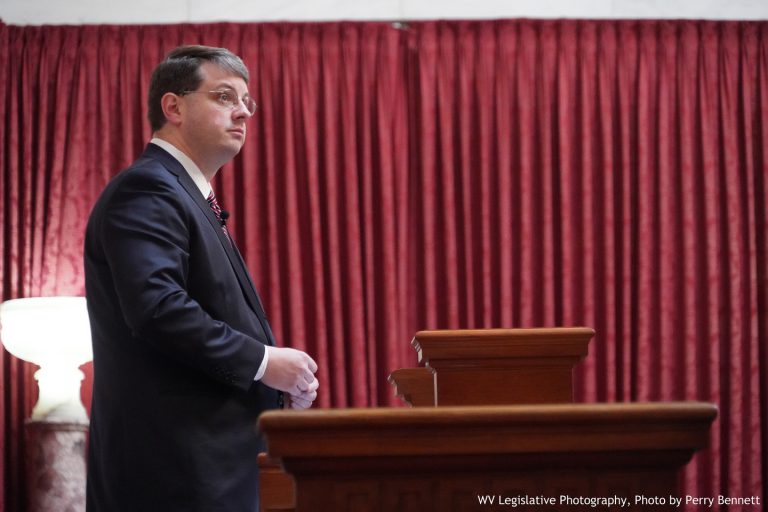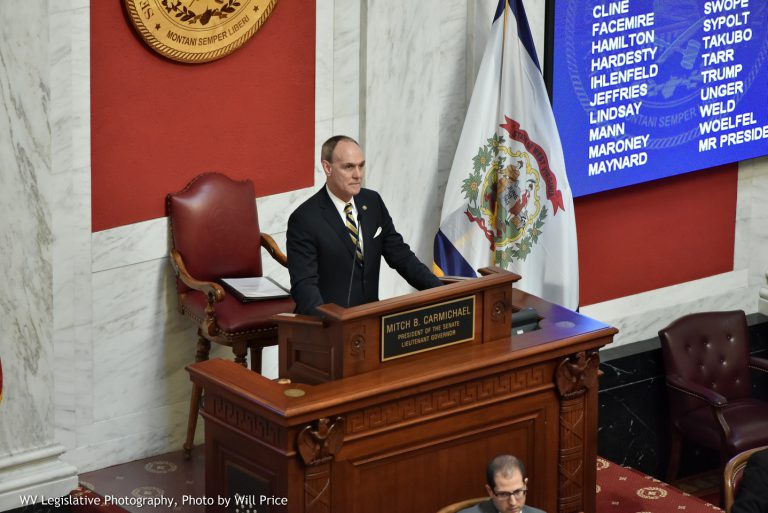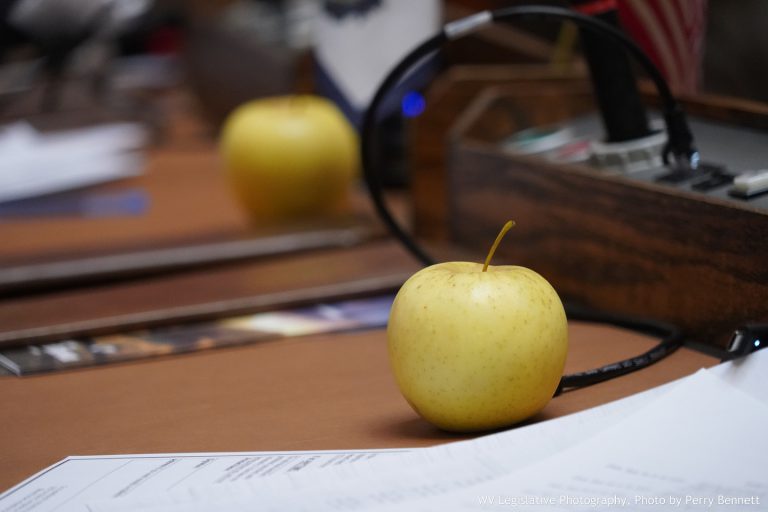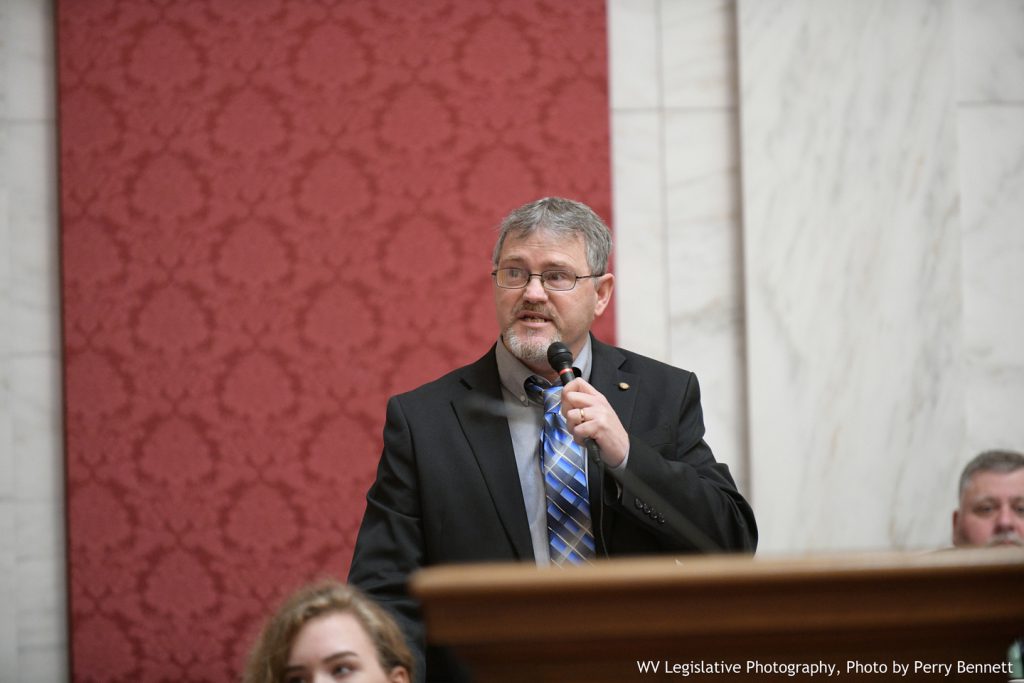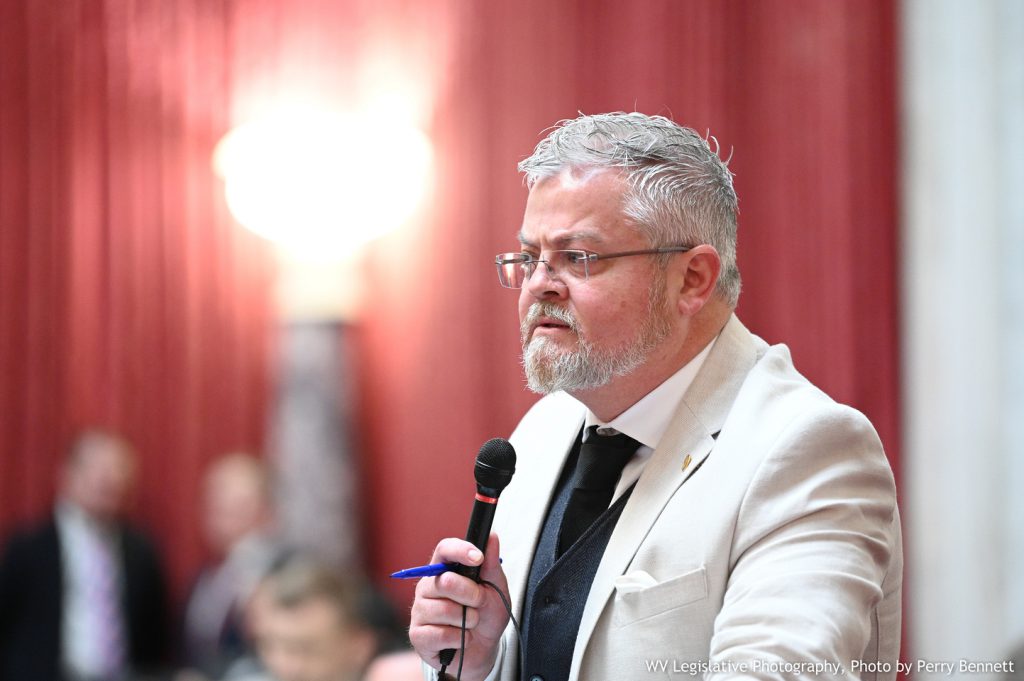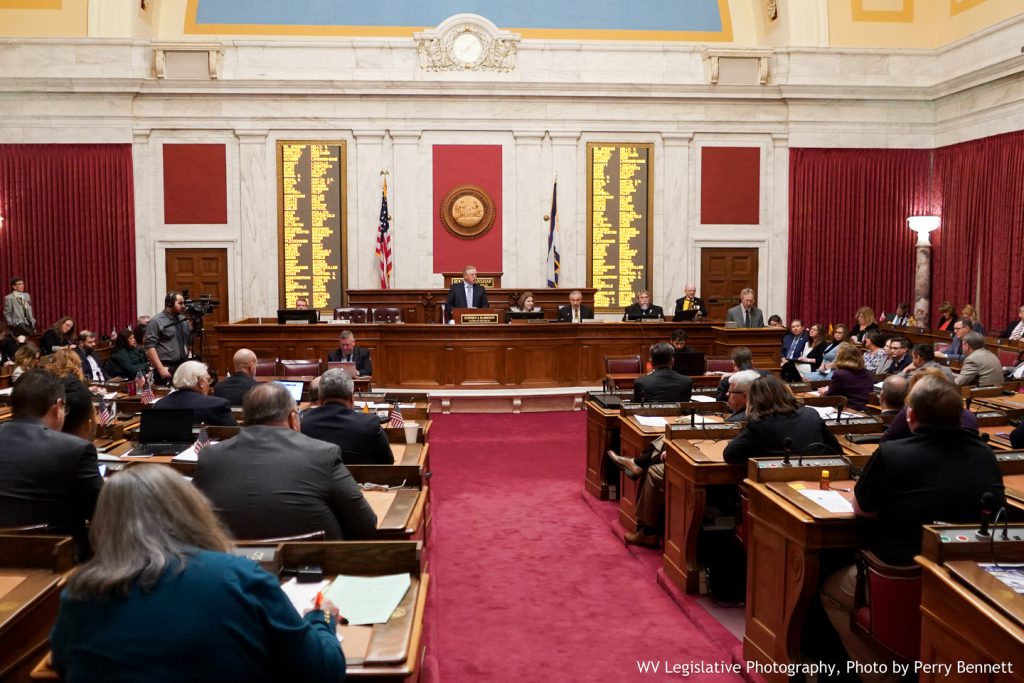As of 4 p.m. Friday, February 15, 2019, the 38th day of the first regular session of the 84th Legislature, 636 bills have been introduced to the Senate. Of those bills, 110 have passed and have been sent on to the House for further consideration.
SB 13: The bill would establish an annual appropriation to the special funds established by racetrack licensees for the purpose of paying regular purses. to distribute funds from the State Excess Lottery Fund to the Purse Fund.
SB 14: The bill would create a special revenue account administered by the Commissioner of Agriculture. The Committee Substitute for the Committee Substitute replaces language in the bill. The specifics of the program would be developed in rules which are authorized in the bill. There is also a required report to the Governor, President and Speaker on the effectiveness of the program which is to be submitted every two years.
SB 19: The proposed statute would provide a legislative declaration that the Senior Farmers Market Nutrition Program provide vouchers for seniors to purchase products from farmers’ markets.
SB 26: The bill would permit full time employees of educational services cooperatives to participate in the State Teachers Retirement System and the State Teachers’ Defined Contribution Retirement System.
SB 40: The bill would allow the West Virginia Supreme Court to establish and operate a military court called the Military Service Members Court, a stand-alone court operated in conjunction with drug courts and other specialty courts. The bill encourages the Supreme Court to give deference to circuits or regions operating Military Service Member Court programs to maximize flexibility, and to consider regional and other differences and circumstances. Once established, Military Service Member Court programs may not be terminated without at least six months written notice from the Supreme Court administrator to the Speaker of the House of Delegates and the President of the Senate.
SB 47:The bill would amend current West Virginia code which currently provides a favorable tax treatment to wind power projects. In particular, the code section states that each wind turbine installed at a wind power project, and each tower upon which the turbine is affixed, shall be considered personal property that is a pollution control facility. As a pollution control facility, it is subject to an allocation of the value of property determined by the WV Tax Commissioner in accordance with that section, and all of the value associated with the wind turbine and tower shall be accorded salvage valuation.
SB 60: The bill would make unlawful for any person to practice or offer to practice athletic training in the state without a license or permit.
SB 66: This bill would attempt to prevent the use of deceptive lawsuit advertising and solicitation by providing criminal penalties.
SB 74: The bill would exempt people who volunteer their time or services, without wages, for a ski area operator or for a ski area sponsored program from workers’ compensation coverage, notwithstanding that the people may receive noncash remunerations.
SB 153: The bill would end the practice of ongoing charges of consumer credit, debit cards or third-party payment accounts without the consumer’s consent for ongoing shipments of a product or ongoing deliveries of services. The bill requires that businesses provide clear and conspicuous disclosures relating to automatic renewal offers or continuous service offers. The consumer must provide affirmative consent before charging a customer an automatic renewal offers or continuous service offer.
The bill provides for a civil cause of action to recover actual damages and $1,000 per violation. No action may be brought until the consumer provides written notice of the violation to the business.
SB 285: The bill would create a procedure for selling homemade food items and allows for certain exemptions from licensing, permitting, inspections, and packaging laws. It also allows for third-party distribution of those items.
SB 291: The bill rewrites a section of code by defining terms, specifically adding personnel from the Division of Forestry as an “emergency responder.” If passed, the bill would give statutory survivor benefits of $100,000.00 to Division of Forestry personnel who die during an emergency wildland fire response.
SB 296: The purpose of the proposed bill is to open an 11-month enrollment period in which certain members of the Public Employees Retirement System may purchase previously forfeited service credit. The bill would amend dates in the statute, providing an opportunity for any members who have previously forfeited service credit accrued toward the West Virginia Public Employees Retirement System to purchase the forfeited credit.
SB 317: The bill would create a new article of code authorizing three or more contiguous counties to form a multi-county trail network authority. The new article is loosely modeled after an article which created the Hatfield McCoy Regional Recreation Authority and allows multi-county trail network authorities to incorporate private land into authority-managed trail systems. The bill provides legislative findings, highlighting the economic benefits that recreation could bring to the state.
The bill highlights the following areas:
- Creation of an Authority; Board
- Prohibited Acts for Trail Users; Criminal Penalties
- Limited Liability for Landowners
- Purchasing Requirements; Criminal Penalties
SB 339: The bill would allow people 16 years of age or older to possess pepper spray on the Capitol Complex for self-defense purposes. The bill would also allow the Director of Protective Services to temporarily prohibit the possession of pepper spray during designated special events on campus.
SB 345: The bill would amend term for an entity who receives a state grant from “person” to “grantee” and by defining “grantee” to include a state spending unit and local government. It changes “person” to “grantee” throughout the section.
SB 352: The bill would modify the procurement process of the Division of Corrections & Rehabilitation by amending code so that it:
- Broadens the procurement bonding requirements by making the furnishing of a bond permissive, not mandatory, and expanding the types of surety that may be required.
- Allowing for best value procurement when it is advantageous to the state while also setting out the criteria for evaluating best value proposals.
- Allowing for direct award contracts without competitive bidding in instances where only a single source or effectively a single source for the commodity or service is available.
- Enumerating various grounds that disqualify a vendor from being awarded a contract with the division or having an existing contract renewed.
The bill also adds a new section of code that creates a special revenue fund for the division’s sale or disposition of surplus property. It sets out the grounds and procedures for the sale or disposition of surplus property as well. Money in the special revenue fund is required to be used for facility maintenance and repair.
SB 393: This bill intends to protect the right to farm and to protect agricultural operations from nuisance litigation if the facility has been in operation for more than one year.
The bill adds a new section of code which provides for additional limitations on nuisance actions.
SB 405: The bill would replace the current maximum amount of expenses recovered by a purchaser from $200 to $500.
SB 408: The bill would clarify who has the authority to make determinations of indigency for the purpose of eligibility with the public defender services. The Committee Substitute would give the authority to make the determination to the court administrator in circuits with one. In circuits with no administrator but a public defender’s office, a public defender employee makes the determination; circuits with neither an administrator or a public defender office, the circuit court makes the determination.
SB 440: The proposed legislation is a direct result of events that happened at West Virginia University in 2018. Five fraternities disassociated themselves from the University, and were subsequently banned from rejoining the University again for the next ten years.
Under current law, the anti-hazing law only relates to greek chapters that are a part of a higher education. The bill would amend the current code to include any students who are enrolled in a school of higher education, and are a part of a greek chapter, can be prosecuted for hazing. Whether or not a chapter is associated with a school or not.
SB 442: The proposed bill would decrease the Insurance Commissioner’s current expenses line item by $10,000.
SB 443: The bill would appropriate federal money to the Department of Health and Human Resources. It would increase current expenses appropriation for Division of Health – Community Mental Health Services by $1.4 million; increase personal services for Division of Human Services – Child Care Development by $200,000; increase current expenses for Division of Human Services – Child Care Development by $13 million.
SB 444: The bill would increase current expenses to Division of Health- Laboratory Services fund by $885,554, and increase current expenses to Division of Health – West Virginia Birth-to-Three fund by $885,554.
SB 452: The bill would increase current expenses for Division of Justice – Second Chance Driver’s License Program by $100,000.
SB 461: The bill would clarify taxation of lottery winnings. It clarifies that “gross prizes” as newly defined in the bill are subject to personal income tax withholding. The bill also sets out that all lottery prizes are to be taxed as “source income” subjecting them to all state and federal income tax laws so withholding of state taxes occurs whenever federal taxes are required to be withheld.
SB 481: The bill would alter the statutory, in-state residency restriction for members of the Judiciary Vacancy Advisory Commission (JVAC), which currently prevents more than three members of the Commission from being residents of the same congressional district of the state. The bill would provide that no more than four members may be residents of the same congressional district, and no more than two members of the JVAC may be residents of the same state senatorial district.
SB 491: The bill would extend the statutory deadline for the implementation of automatic voter registration in conjunction with certain Division of Motor Vehicles (DMV) transactions from July 1, 2019 to July 1, 2021. The DMV is in need of updating their system mainframe before they can implement the automatic voter registration. The proposed legislation would give the DMV more time to update their system mainframe.
SB 496: The bill would transfer some or all authority to regulate milk and milk products from the Department of Health and Human Services to the Department of Agriculture. This bill also establishes rules which the Department of Agriculture would be required to follow in order to successfully distribute milk or milk products.
SB 499: The bill would modify West Virginia’s tax code, as it relates to taxation of partnerships, due to changes made to federal law. Under the new federal partnership audit regime, the Internal Revenue Service will assess the partnership, or other pass-through entity, an imputed federal income tax liability. The partners, and equity owners of other passthrough entities, will not be reporting federal audit adjustments to the Tax Commissioner and paying additional West Virginia income taxes.
The bill would also update the West Virginia Personal Income Tax and Corporation Net Income Tax sections of code to allow the Tax Commissioner to collect revenue the State would have received prior to the changes in federal partnership audit regime, but not with the federal changes and the current structure of our code. These amounts will not be collected without enactment of this legislation.
SB 516: This bill would require payment to an attorney representing an adoptive parent and the legal guardian. It also requires an attorney to submit an invoice for the work, along with a copy of the final order, to the caseworker responsible for the child or children. If funds exist, the Department is to pay the invoice within 45 days of submission of the invoice. The Department is also required to propose legislative rules for promulgation setting a fee schedule for attorneys in these cases.
SB 518: This bill prohibits a person from selling or trading a drug product containing dextromethorphan to a person under the age of 18. It also prohibits a minor under the age of 18, unless emancipated, from purchasing the product. The bill does not relate to valid prescriptions. A person found guilty of violating these provisions is guilty of a misdemeanor and subject to a fine of $100 to $250.
SB 542: The bill would amend and reenacts code concerning registration plates. The bill would allow for the creation of various special registration plates, many of them related to honoring members of the military, some of which are exempt and others that are not from the payment of registration fees.
The bill would permit a qualifying applicant, to choose one non-exempt plate instead of one exempt plate without having to pay registration fees.
SB 563: This bill would add language to a section of code limiting admission of certain evidence in sexual offense prosecutions, and prohibits a court from ordering, or otherwise requiring, a victim in a sexual offense prosecution from being required or ordered by a court to submit to sexually invasive physical examinations. For the purposes of the bill, a sexual offense includes any crime of which sexual intercourse, contact, or intrusion is an element of the crime.
SB 590: This bill amends a section of code relating to permitting guided bear hunts by licensed outfitters and guides; providing the Director of the Division of Natural Resources rule-making authority; setting license fee for outfitter and guide applications; and providing penalties for guides and outfitters.
HB 2191: The bill would allow operators to be licensed as retailers in up to 10 locations, increasing the maximum bet permitted for limited video lottery terminals and removing restrictions on bill denominations accepted by limited video lottery terminals. This bill also fixes the state share of gross profits from a limited video lottery revenue at 50 percent beginning July 1, 2019.
HB 2307: The bill would remove the requirement to take an examination for a barbering and cosmetology license to practice in this state by an applicant with a valid license from another state. The bill also states the board may issue a provisional license to an applicant with an expired license and authorizes the board to set the applicable fees for a provisional license and shall not exceed half the cost of a full license.
HB 2446: The bill would establish the Blue Alert program which will aid in locating a law-enforcement officer who has disappeared in the line of duty or locating a suspect or suspects who kill or inflict a life-threatening injury upon a law-enforcement officer and remain at large.
HB 2459: The bill would allow West Virginia to opt out of a federal law passed in 1996 transposing a lifetime ban on receiving SNAP benefits on persons convicted of drug felonies. The federal law allows states to opt out. Since 1996, 47 states have modified the ban or opted out altogether. West Virginia, South Carolina and Mississippi are the only states which still have the lifetime ban. The bill would allow West Virginia residents who have been convicted of a drug felony to receive SNAP if they are otherwise qualified.
HB 2492: The bill would require a report of neglect or abuse of an incapacitated adult or facility resident or of an emergency situation involving such an adult shall be made immediately to the Department Health and Human Resources’ adult protective services agency.
HB 2521: This bill would revise existing code to provide that, in addition to pelts (which are already permitted under current law), fur-bearer parts, including: glands, skulls, urine, essence, claws, baculum, and meat, of game or fur-bearing animals taken during the legal season may be sold, traded or bartered. The bill also adds language permitting the sale, trading or bartering of the hide and tails of legally killed squirrels.


